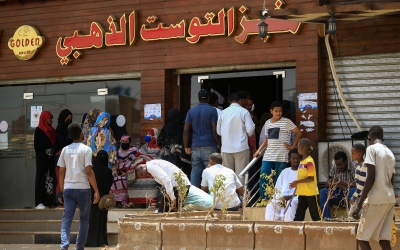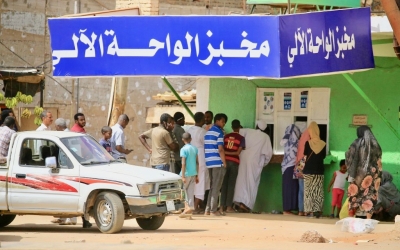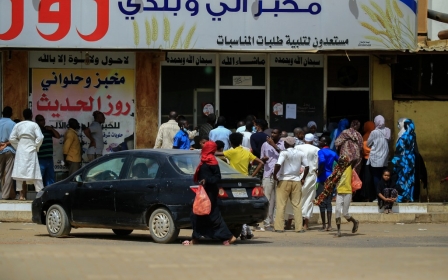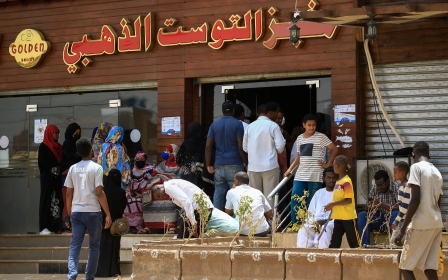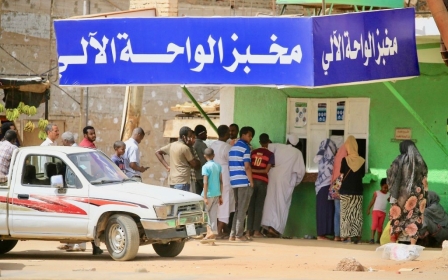Pro-Bashir Sudanese protesters march on army HQ despite coronavirus ban
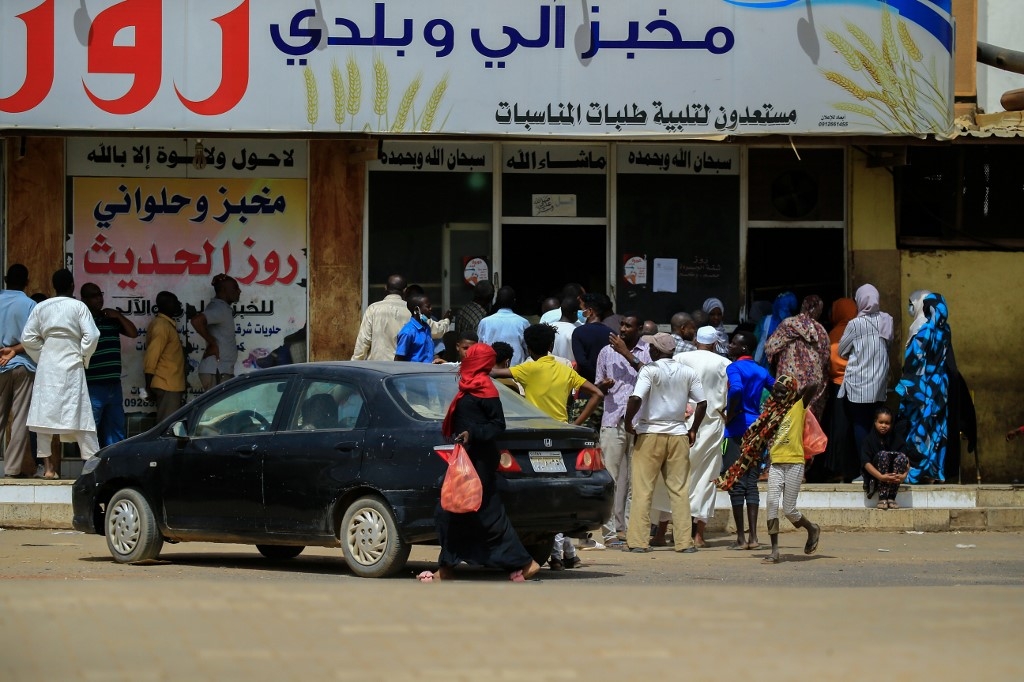
Sudanese security forces have broken up a protest by hundreds of supporters of ousted president Omar al-Bashir outside the army command's headquarters in Khartoum, demanding the fall of the transitional government.
Thursday's rally was the first in which protesters have reached the army's central command area since last June, when a sit-in protest there was bloodily dispersed.
Witnesses told Middle East Eye that hundreds of demonstrators reached the army headquarters after thousands had earlier protested in the centre of the capital.
The protesters, who railed against Prime Minister Abdalla Hamdok's recent austerity policies and higher food prices, demonstrated in defiance of a ban on large gatherings to stem the coronavirus outbreak.
The army, which had deployed heavily around the headquarters, denied that tear gas was used to disperse the protesters.
Witnesses also told MEE that clashes on Thursday also erupted between Bashir supporters and pro-democracy protesters in Atbara city, in northern Sudan.
The protests came two days ahead of a three-week curfew starting on Saturday in Khartoum state, including the capital and its twin city Omdurman, which was announced after the country reported its biggest daily jump in confirmed novel coronavirus cases.
Thirty-two cases of the coronavirus have been officially recorded so far.
Hamdok sacked Khartoum governor Ahmed Abdoun, the premier's office announced in a statement later on Thursday.
The governor's duties would be transferred to the minister of federal government until a new appointment is made, it added.
It was unclear why Abdoun had been removed but some sources told MEE it was because he had objected to the lockdown measures that were to be implemented on Saturday.
'No bread and no fuel'
Ammar Hassan, 50, told MEE that the demonstrators outside the army headquarters had raised "Islamic slogans" calling for the overthrow of Hamdok's government.
Hassan said the demonstrators also chanted: “No bread and no fuel, down, down Hamdok government” and “Just fall FFC,” referring to the Forces for Freedom and Change movement that led the protests against Bashir who was overthrown by the army last April.
'The Sudanese people are suffering, they won't die because of coronavirus, they will die because of hunger... and the government's failure in this regard is very clear'
- Khalda Alnur, protester
Mohamed Ali, a leading member of the United Popular Movement, a coalition which accuses the government of implementing a narrow political agenda hostile to Sudanese Islamic values and identity, said the police had used violence, including sticks and tear gas, to disperse the protests.
“Life has become very difficult and hardship is everywhere, this government has failed to do anything for the Sudanese people," he said.
"We accepted the will of the young generation that they wanted political change and to remove of Bashir after 30 years in power, but the FFC has stolen their dreams, what we are doing now is correcting the path of the revolution.”
Unbearable economic situation
Hamdok leads a government of technocrats under a power-sharing agreement between the military and civilian groups for a transitional period due to last until late 2022.
Relations between civilians and the military have been tense, and the government has encountered resistance as it tries to implement economic reforms.
Transitional authorities are also taking steps to disempower Bashir's supporters, including parts of the security services.
Despite Sudan's political transition, which has raised hopes of more reforms, the economy remains in deep crisis.
Many in Sudan still have to queue for hours to buy bread.
Last week, authorities announced an increase in bread prices, meaning one Sudanese pound (about two US cents) now buys only a 50-gram loaf of bread, compared to one weighing 70 grams previously.
A tripling of the price of bread was the trigger for the first street protests against Bashir in December 2018.
Protester Khalda Alnur told MEE that Thursday's demonstration was not just for political goals but motivated by soaring prices in the local markets and the unbearable economic situation.
“The Sudanese people are suffering, they won't die because of coronavirus, they will die because of hunger as the economy is down and the government's failure in this regard is very clear,” she said.
Army plays down protest
Brigadier Amir Mohamed El-Hassan, a spokesman for the Sudanese army, downplayed the protest, stressing that the army is committed to protecting democracy through the country's transitional period.
Hassan told MEE that only a few protesters had reached the square in front of the army headquarters but the authorities had dispersed them peacefully.
“I don’t see it’s a serious matter... it’s normal that a group of citizens has gathered in front of the army headquarters and we let the police and security forces deal with them according to the laws,” he said.
'It’s totally incorrect that there is any military coup attempt, or even planning for that, however there are some agents and political parties that want to spread these rumours'
- Brigadier Amir Mohamed El-Hassan
Hassan also denied local media reports claimed that pro-Bashir agents were preparing for a military coup in collaboration with some members of the army.
“It’s totally incorrect that there is any military coup attempt, or even planning for that, however there are some agents and political parties that want to spread these rumours to destabilise the transitional period,” he said.
“Again the army is fully committed to the constitutional declaration and the transitional period. This country will only be ruled by the elected persons after the end of the transitional period and the army will do its duties in this regard.”
Regional media reports claimed that the Sudanese Muslim Brotherhood had also been preparing for a military coup on the first anniversary of the overthrow of Bashir on 6 April, but the army also denied those claims.
'The people are not accepting them'
Despite Hassan's comments, political analyst Salah Aldoma believes that the pro-Bashir demonstrators are aiming at disturbing the transitional period in order to pave the way for a military coup.
Aldoma told MEE that the current wave of protests are using the same tactics as the pro-democracy protesters, but adding that the real popular support for the protests is very low.
“The Islamists are now using the same tactics of the revolutionaries by going to the army headquarters and demonstrating in different areas in order to disturb the transitional period," said Aldoma.
"But I see the people are not accepting them, so they have to convince the Sudanese people who are fed up with ruling Islamists after 30 years of experience.”
However, Aldoma, a professor of political science and international relations, said that the experience of Sudan is totally different from the Arab Spring countries where he said the normal people were cheated by the slogans of the Islamists.
“The Islamists in Sudan will never come back to power in the coming period because the experience of the Sudanese is totally different from the other countries in the region,” he stated.
Sami Ahmed, another of the protesters on Thursday, accused some regional countries of conspiring against Bashir and his government, vowing to bring down the current administration and stop the plans of its regional supporters.
“We knew that some regional countries, especially the Gulf ones, were involved in the ousting of Bashir, despite that he was the elected president of Sudan and still supporting [them] in order to serve their interests regarding the Yemen war and other regional issues,” he said.
'Using the coronavirus lockdown'
A leading member of the FFC ruling coalition told MEE that Bashir supporters were taking advantage of the coronavirus lockdown and the absence of other political parties who had supported people “staying at home” in order to take control of the streets and organise the protests.
“The pro-Bashir agents are using these circumstances of the coronavirus lockdown, as most of the people are staying home, in order to disturb the situation,” the member, who preferred not to be named because he is not authorised to talk to the media, said.
“These moves by the Islamists prove that they are not keen for the health and the lives of the Sudanese, so the normal citizens are not responding to them at all.
“We don’t care about those mobs right now, we are now focusing to support the government efforts in fighting the coronavirus, this is our first battle beside our people right now,” he stressed.
Middle East Eye delivers independent and unrivalled coverage and analysis of the Middle East, North Africa and beyond. To learn more about republishing this content and the associated fees, please fill out this form. More about MEE can be found here.


